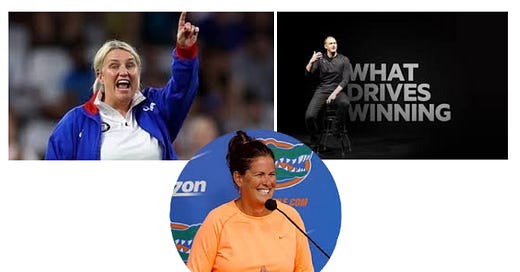After attending the annual United Soccer Coaches convention this past week a common thread was noted. As many coaches with a great deal of experience will tell you, they do not attend such functions with the hopes of finding some revolutionary tactics that will completely change their current program and instantly lead to a club, state or national championship. Taking away just a couple of positive or new ideas is usually considered a productive time. After attending many sessions with some highly rated presenters, a theme was noted between the amazing “What Drives Winning?” combo of Brett Ledbetter and Becky Burleigh and the USWMNT coach Emma Hayes. (If you are unfamiliar with “What Drives Winning?” look up their interviews on YouTube as well as their workbooks and other books that are available online.)
Keep in mind that all three of these presenters are very experienced, highly recommended, and have worked with the greatest teams, coaches, and athletes in the world.
So what do they all have in common? The big picture. While Ledbetter and Burleigh often focus on leadership and the mental aspect of sports, they continually remind everyone of the fact that they rarely, if ever, discuss the actual result of a game or outcome with their clients. Emma Hayes, who recently followed up her stellar career as the head coach of the Chelseas women’s team with a gold medal with the USMNT was very much the same. During Hayes’ presentation, she shared great insight into the 76 days she had (once named and allowed to start with the team) before the Olympics. While the team and coaching staff did a lot of great exercises on culture and team building to rebuild the USWNT dynasty in a matter of short time, she also mentioned something that stood out-THEY NEVER TALK ABOUT WINNING THE GAME.
How could this be possible for the coach of the most highly decorated women’s national soccer program when they compete at the highest level, under the highest amount of pressure possible with the insurmountable expectations that come along with such a successful program you may ask? Simple. All three of these leaders spoke about the necessity to focus on the process, not the outcome. All three talked about how important it is to do the little things every single day that eventually will lead to success. All three reiterated the value of focusing on the big picture, not the final, a championship, or reaching your potential.
While this may seem contradictory to some, this common thread among each of them shows not only the value of staying focused on the big picture but also the negatives that we can all fall into if we focus only on ‘false results.’ Gaining a win over an inferior opponent when your team did not have a good performance or receiving an award when you know you did not necessarily challenge yourself are just two examples. Too many times we all fall into the habit of focusing only on our record or the latest result we had in our last competition. While this may lead to short-term happiness, it also leads to a false sense of excellence. The most successful athletes in the world and the most accomplished teams focus on the process of getting better each day and how it will help them reach their overall goal at the end of the road, or the big picture.
Please take a moment to look into each of these three excellent people as they have great insight that can be very helpful to anyone, regardless of sport!





